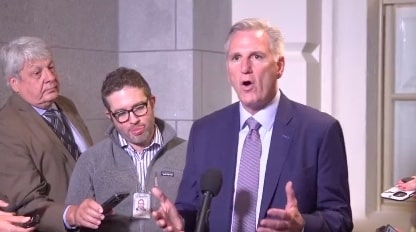The Republican-led House on Tuesday failed to advance two spending bills crucial for keeping the government from shutting down under a midnight September 30 budget deadline.
Amid the GOP’s five-seat majority, the House voted 214-212 to defeat a measure that would have opened debate on the $886 billion defense appropriations bill for 2024. Five hardline Republicans joined all Democrats in opposing the GOP measure.
An even larger division has emerged to prevent lawmakers from voting on a short-term stopgap measure aimed at keeping the government open into December while negotiations can continue.
Speaker Kevin McCarthy (R-CA) defended the standoff on social media, writing, “The difference between the Republican House of Representatives vs. the Pelosi era: It’s not one way or the highway. Members of Congress can actually debate ideas. The Speaker of the House no longer dictates every outcome.”
However, some House Republicans—particularly those from districts President Biden (D) won—are voicing their displeasure with their party’s bottleneck.
“The vast majority of the conference is in alignment on reining in spending, on securing our border, on funding the Department of Defense and we want to move forward with that work,” said Rep. Mike Lawler (R-NY). “Unfortunately right now we have a handful of people who refuse to do that work, because they feel this is the way that they get to what they want.”
While Rep. Juan Ciscomani (R-AZ) said, “Right now it’s about the defense bill, this should be the most straightforward vote for all of us, and we can’t even pass the rule for that.”
In the upper chamber, Republican Senators have been voicing their own alarm at the infighting among their colleagues in the House, with Senate Minority Leader Mitch McConnell (R-KY) warning that government shutdowns have historically been “a loser for Republicans, politically.”
Sen. Lisa Murkowski (R-AK) further noted, “This may be a situation where you’ve got to break glass to make sure that we can get some kind of a deal. I don’t know what that looks like.”
The last government shutdown occurred in December 2018-January 2019 and lasted for five weeks in a dispute between then-President Trump and Democratic Congressional leadership over funding his border wall.
According to the non-partisan Congressional Budget Office, that shutdown—the nation’s longest ever—lowered the nation’s projected level of real GDP in the first quarter of 2019 by $8 billion, of which the CBO estimated only $5 billion was recovered.


